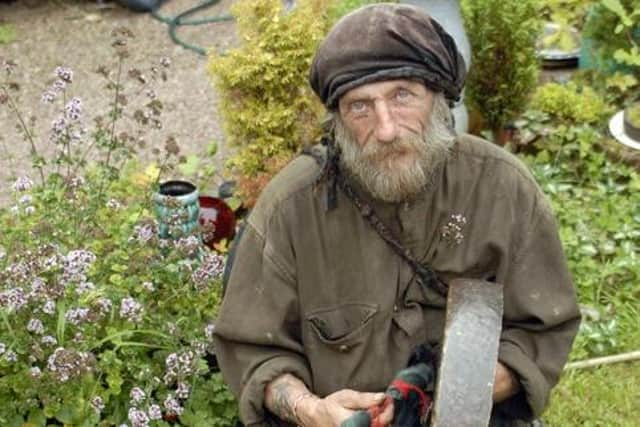Scotsman Obituaries: Magi McGlynn, Scottish hermit and street performer


Magi McGlynn, justifiably styled the Bard of Balquhidder, originated from the Scottish Traveller community, connected to both the Stewarts and the Williamsons.
His father worked on the Callander and Oban Railway, and Magi’s early years were spent at Letham in Perth, and Fowlis Wester, where he learned gardening.
Advertisement
Hide AdAdvertisement
Hide AdLeaving Goodlyburn Secondary School in Perth, Rodney initially trained as a glass blower, but became seriously ill and nearly went blind. In the recent pandemic, he could not wear a mask because, he said, he had only one lung.
He recovered and, around 1990, joined a large group of young people who started a country community in Balquhidder. The rest gradually dispersed, leaving McGlynn and his partner Gillian as long-term residents.
Known as Magi among the country people, McGlynn lived in a secluded stone-walled “bender” with an impermanent thatched and canvas roof, a fireplace and seven small stained-glass windows.
In this home, reached by a steep quarter-mile footpath down a ledge beside a burn, he raised two children, winning a prolonged battle with Stirling District Council over their welfare and their right to live in the unconventional dwelling.
After his family grew up he remained there, with a second partner, Kay, for some years, then alone.
In summer his place was idyllic, surrounded by trusting wild birds, often with visiting musicians and folklorists sitting in the small woodland garden talking, singing and playing, but the winters proved hard.
He needed strength for his self-sufficient way of life. He hefted stone and logs, and would help neighbours with any manual jobs. He worked at gardening while his children were growing up.
Stories abounded. According to one tale, a water board official arrived to turn his water off. “On you go,” replied Magi, pointing to the burn.
Advertisement
Hide AdAdvertisement
Hide AdHe had a circle of friends who looked out for him, supplying his needs. One visited regularly from Glasgow bringing bags of candles. Others saw to his firewood permit, or fetched him for their events, practically kidnapping him for music festivals such as Knockengorroch in Galloway, or for the Callander Poetry Weekends, where he was a hit with poets from Scotland and England. The Celtic fusion band Shooglenifty ran an event in Balquhidder with Magi as a special guest.
Magi had no transport, but a network of regular lifts between country towns when, he said, walking the roads had become more dangerous. When younger, he was a constant walker on these hills.
As time went on, more people learned of Magi’s authentic homestead and he was often pestered by film crews. He was not always easy to pin down. The entrance to his footpath was difficult to spot from the road. If you made it down the path with its rope handrail, crossing the burn, small bells on the branches warned of your approach.
Working by the alignments of the hills, Magi believed his home was the centre of the old Celtic universe. He was a small but dignified figure, noticeable, photogenic, original and timeless. He was recorded wherever he went, singing and reciting, his bodhran at the ready, talking to people of every degree. He became remarkably famous, walking the country in his kilt and pack.
He busked or made chalk pavement drawings in the small towns and in Edinburgh and Glasgow, always willing to play music with others, talking to everyone, often preferring a one-to-one audience, like an Ancient Mariner who “stoppeth one of three”.
He was constantly out and about, yet never seemed hurried or flustered. There was no surprise in coming upon him, at a gathering on Calton Hill, or on Glasgow’s Sauchiehall Street, or even in the coffee shop of the National Library. His high visibility was a result of how hard he worked. He never took a holiday from being Magi McGlynn.
He could act and control an audience, and was crucially aware of his listeners. The poems which he sung or performed were very simple, their message freedom in a large sense, but also his love of Scotland, and they were firmly in the oral tradition.
He would mesmerise tourists, involve bystanders, engage with intellectuals. He could communicate with animals. He once approached a group of Highland cattle with calves, gently persuading them to move away from the Heart of the Travelling People above Loch Fyne, to allow some friends to visit the monument.
Advertisement
Hide AdAdvertisement
Hide AdIt was strangely fitting that, after a few years of failing strength, when his self-reliance was under threat and there was at least one hospital admission as his health problems increased, he died on his own terms in his own place, retaining his highly valued freedom.
As well as a huge retinue of friends, musicians, poets, country people, researchers, farmers and followers, he had family in his sister Diana, his son Michael, and other relatives.
A street musician, a bard, a style icon, Magi McGlynn was one of a kind. He lived to within a few weeks of threescore years and ten, and was buried at the remote Strowan Woodland Cemetery near Crieff, before a standing crowd of enthusiastic mourners.
Obituaries
If you would like to submit an obituary (800-1000 words preferred, with jpeg image), or have a suggestion for a subject, contact [email protected]
Subscribe
Subscribe at www.scotsman.com/subscriptions